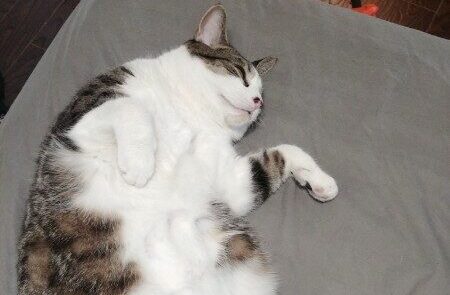While a ‘chonky’ cat or dog may look cute, when pets start to pack on the pounds, it’s cause for concern.
That from the British Columbia Society for the Prevention of Cruelty to Animals (BC SPCA), who say veterinarians are seeing an increasing number of overweight or obese pets.
“The Association for Pet Obesity estimates that 61 per cent of cats and 59 per cent of dogs in the U.S. were classified as overweight or obese in 2022,” says the society in a media release. “A 2019 University of Guelph study of about 19 million cats revealed that felines are heavier now than they were in the 1990s.”
The SPCA says that overweight pets are at a greater risk of developing health problems, which can cost thousands of dollars in vet bills to treat.
“Obesity in dogs and cats is associated with high blood pressure, type 2 diabetes, kidney disease, osteoarthritis, difficulty breathing and an increased risk of getting cancer,” says the SPCA. “Obese pets have a decreased life expectancy and lower energy levels. They find it difficult to engage in active play and live their lives to the fullest.”
BC SPCA Vancouver Animal Hospital’s lead veterinarian, Dr. Kyla Townsend says weight loss can have dramatic effects on pet behaviour.
“Often guardians have trouble seeing how being overweight affects their pet because it happens gradually, but when the pet loses weight, they realize,” says Townsend. “Once an animal loses weight, guardians will often say they are acting like a puppy or kitten again.”
If you don’t know if your pet would be considered overweight, you can check with your veterinarian. They can give you a body condition score (BCS) to determine the degree to which they are overweight. A BCS measures how easily their ribs can be felt, how much fat is beneath their skin, and muscle mass, among other factors.
For those hoping to help their pets slim down, pets should be encouraged to be more active. Food intake should be monitored, table scraps reduced and treats should be cut back on. The BC SPCA recommends using puzzle feeders to help them moderate their intake.
“Puzzle feeders allow them to express their natural hunting and foraging behaviours while providing mental and physical stimulation. They can help pets eat more slowly,” says the SPCA.
“These types of food puzzles can motionless, rolling, store-bought, or homemade. One example for dogs is to cut a small hole in an old tennis ball and fill the inside with kibble. For cats, fill a cardboard tube with kibble, fold down the edges and cut a small hole to dispense the food.”
One of the keys is being patient because weight loss can be a long process.
The SPCA says, “It can take a year for the pet to return to a healthy weight. For dogs, a healthy weight loss is one to five pounds per month. Cats should lose 0.5 per cent to two per cent of their body weight per week.”




